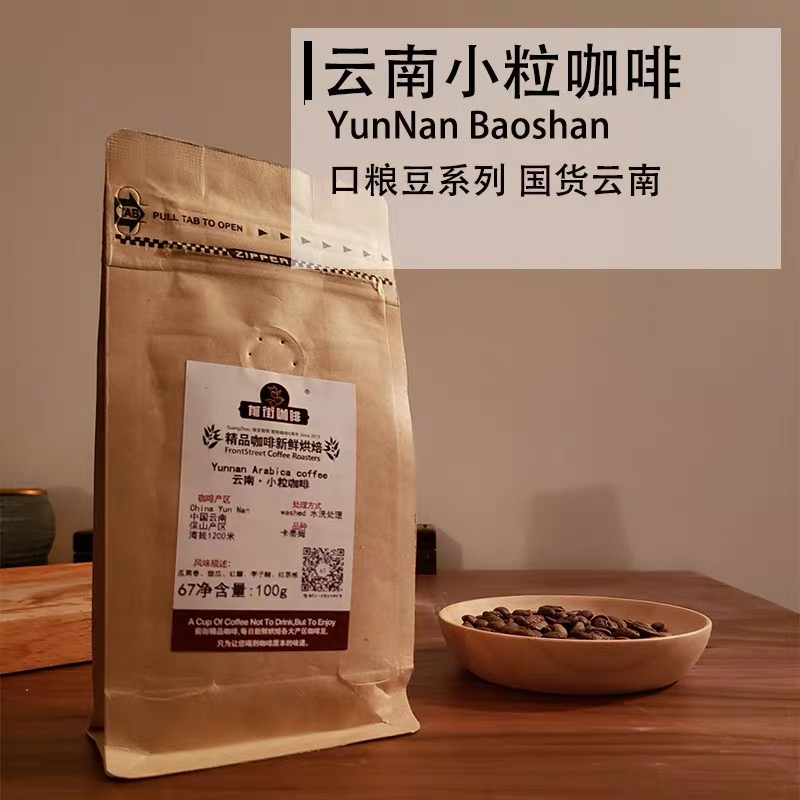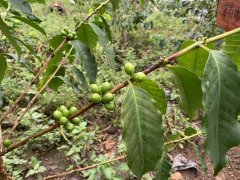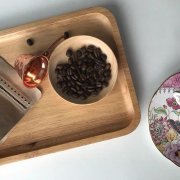The origin of the best boutique coffee in China, the story of Yunnan small-grain coffee, is Yunnan coffee delicious?
Coffea yunnanensis
Country of Origin: China
Production area: Yunnan
Breed: Katim
Altitude: 1200 m
Treatment: Washing
Degree of baking: medium baking
Flavors include melons and fruits, brown sugar sweetness, plum sourness and black tea.
Yunnan Arabica coffee, originally refers to the early planting variety Tiepica in Yunnan, due to historical reasons, after the 1980s, Tiepica basically became the world of hybrid Katim, Katim is a hybrid variety containing Luo bean gene, planting area more than 98%, so it became Yunnan Arabica coffee instead. Planting areas are mainly distributed in Lincang, Baoshan, Simao, Xishuangbanna, Dehong and other prefectures. Baoshan has an average temperature of 21.5°C and a maximum temperature of 40.4°C. It is basically frost-free all year round and is recognized as the best producing area of Arabica coffee. The Arabica coffee cultivated here is famous for its strong but not bitter, fragrant but not strong, well-proportioned grain facets, mellow fragrance and fruity flavor. The International Coffee Organization's tasting experts rated Yunnan coffee as Colombia's wet-processed Arabica coffee, the highest quality coffee in the world.

Catimor coffee beans (catimor): catimor is not purely Arabica descent, it is a hybrid of the species Timor (belonging to the Robusta species) and caturra (a variant of the Bobang species), so catimor has 25% Robusta descent, and its Robusta descent also determines its taste defects: aroma is not rich enough, and the overall taste is bitter, prone to astringent taste and more pungent musty taste.
Water washing method:

Coffee fruits are taken to the processing plant within 6-12 hours of picking for weighing, then soaked and washed, and the skin and pulp are removed by a machine, leaving only coffee beans wrapped in parchment. At this time, there is also a layer of mucous membrane outside the beans, so it is necessary to produce acid through fermentation to make the mucous membrane fall off. This layer of mucous membrane is the pectin part. The pectin part of the mucus adhesion is strong, not easy to remove, so it needs to be placed in a clean sink for about 18-36 hours, so that pectin fermentation produces acid decomposition mucus. After the mucus is broken down, a small amount of water is injected and stirred to allow the pectin decomposition products of the coffee beans to fall off. After washing, you will get coffee beans wrapped in parchment paper and hard skin. After washing, defective coffee beans are sorted out and then spread on concrete/tarp/drying beds for sun exposure. The drying time depends on the weather, and the general drying time varies from 5 to 14 days. After drying, the moisture content of coffee beans will drop from 55% to 11%. After drying, the beans are stored with parchment, which is removed before the beans are exported.
Cup taste reflects: soft entrance, Asian herbal aroma, sour lively bright, cheeks, sour soft, mellow balanced sense of good, rich layers, aftertaste dark chocolate, honey, sucrose taste obvious, completely cooled, brown sugar flavor.

Important Notice :
前街咖啡 FrontStreet Coffee has moved to new addredd:
FrontStreet Coffee Address: 315,Donghua East Road,GuangZhou
Tel:020 38364473
- Prev

What are the varieties of coffee beans in Yunnan? Yunnan Huaguoshan coffee taste and producing area introduction.
Yunnan Huaguoshan producing country: China Origin: Yunnan altitude: 1400-1700 m varieties: iron card treatment method: washing and baking degree: moderate baking flavor is reflected in melon, nut, sucrose, cream, soft fruit acid, strong but not bitter, fragrant but not strong, flower fragrance, sweet melon in the middle, black tea taste more balanced at the end. Typica is the best in Ethiopia.
- Next

Yunnan fine coffee beans, the origin story of the Chinese own good coffee, Front Street 2013.
Yunnan Qianjie 2013Country of Origin: ChinaProduction area: Lincang, YunnanVariety: Iron PickupAltitude: 1300mTreatment: Sunbaked Degree: ModerateRoasted Flavors are nutty, berry, brown sugar, tea. Lincang City Lincang City is located in the southwest of Yunnan Province. The Tropic of Cancer runs through the south, adjacent to Pu 'er in the east, Dali in the north, Baoshan in the west, and the border with Myanmar in the southwest.
Related
- Detailed explanation of Jadeite planting Land in Panamanian Jadeite Manor introduction to the grading system of Jadeite competitive bidding, Red bid, Green bid and Rose Summer
- Story of Coffee planting in Brenka region of Costa Rica Stonehenge Manor anaerobic heavy honey treatment of flavor mouth
- What's on the barrel of Blue Mountain Coffee beans?
- Can American coffee also pull flowers? How to use hot American style to pull out a good-looking pattern?
- Can you make a cold extract with coffee beans? What is the right proportion for cold-extracted coffee formula?
- Indonesian PWN Gold Mandrine Coffee Origin Features Flavor How to Chong? Mandolin coffee is American.
- A brief introduction to the flavor characteristics of Brazilian yellow bourbon coffee beans
- What is the effect of different water quality on the flavor of cold-extracted coffee? What kind of water is best for brewing coffee?
- Why do you think of Rose Summer whenever you mention Panamanian coffee?
- Introduction to the characteristics of authentic blue mountain coffee bean producing areas? What is the CIB Coffee Authority in Jamaica?

